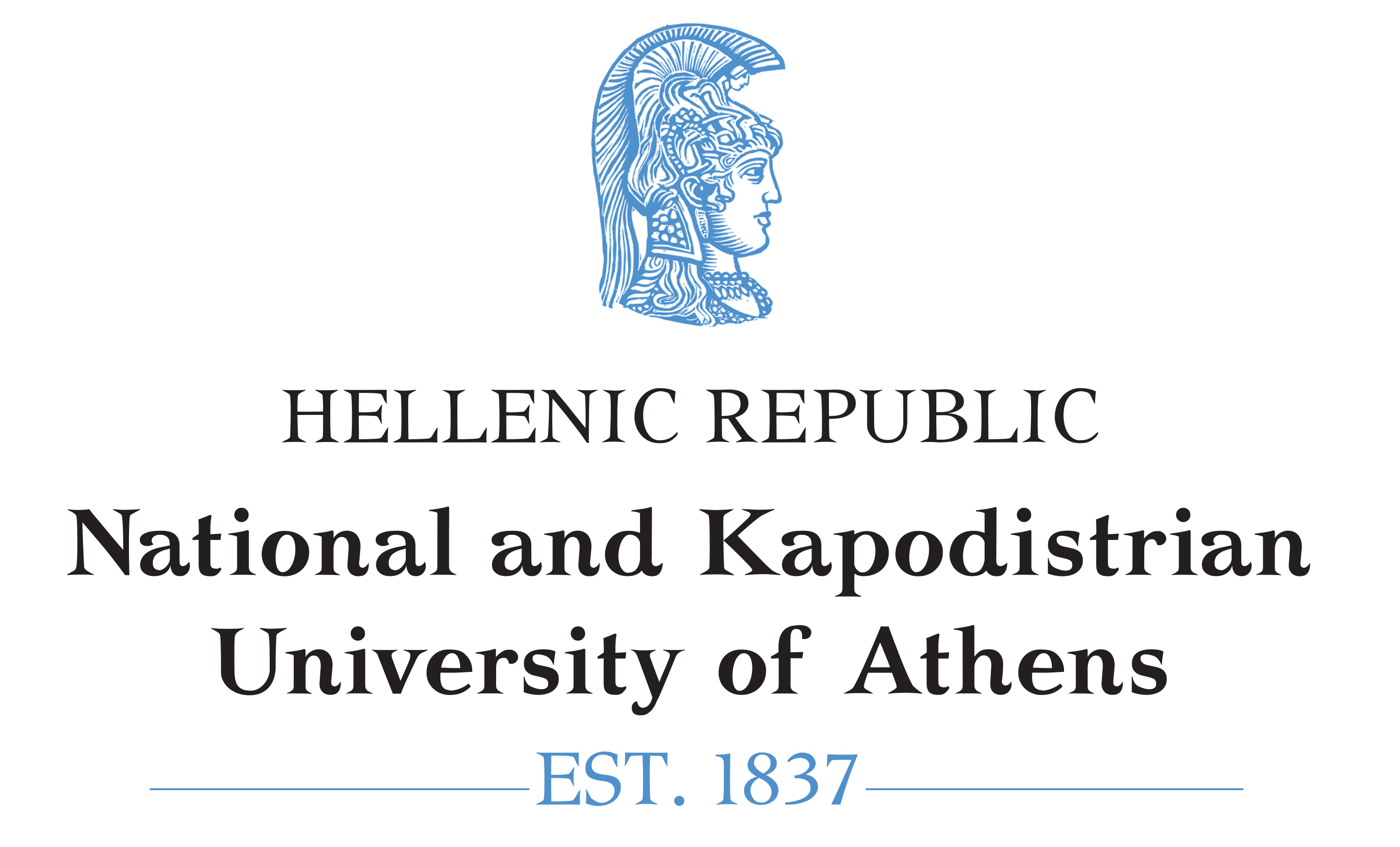- Αρχική
- NEWS AND EVENTS
- THE PROGRAM
- ADMISSIONS
- APPLICATION
- RESOURCES
-
ACADEMIC STAFF
- GEORGIOS ARABATZIS
- DIMITRA ANDRIANOU
- SOPHIA ANEZIRI
- ATHENA BAZOU
- GIORGOS BOUROGIANNIS
- AIKATERINI - NINA CARVOUNIS
- NIKOLAS DIMAKIS
- ELENI FASSA
- MYRTO GARANI
- NIKOS GIANNAKOPOULOS
- NIKOLAOS HAROKOPOS
- ROSALIA HATZILAMBROU
- NIKOLETTA KANAVOU
- CHRYSANTHOS KANELLOPOULOS
- GRAMMATIKI KARLA
- STYLIANOS KATAKIS
- EURYDICE KEFALIDOU
- KONSTANTINOS KOPANIAS
- AIKATERINI KOROLI
- EVGENIA D. MAKRYGIANNI
- STEPHANOS MATTHAIOS
- ANDREAS MICHALOPOULOS
- GIORGOS MITROPOULOS
- ANDREAS MORAKIS
- YIANNIS PAPADATOS
- SOPHIA PAPAIOANNOU
- AMPHILOCHIOS PAPATHOMAS
- VASSILIS PETRAKIS
- VAIOS VAIOPOULOS
- DIMITRIS PLANTZOS
- ELENI PSOMA
- MICHEL ROGGENBUCKE
- MARIANNA THOMA
- GIORGOS VAVOURANAKIS
- ANASTASIA VERGAKI
- IOANNIS VOSKOS
- TIMETABLE
- CONTACT
-
GALLERY
- VIDEOS
- PNYX, JULY 2021
- NATIONAL ARCHAEOLOGICAL MUSEUM, JULY 2021
- LYCEUM OF ARISTOTLE, NOVEMBER 2021
- THEATRE OF DIONYSUS, NOVEMBER 2021
- CRETE, NOVEMBER 2021
- ARCHAEOLOGY AND HISTORY OF ART MUSEUM AND CONSERVATION LABORATORY, SCHOOL OF PHILOSOPHY, DECEMBER 2021
- KERAMEIKOS, DECEMBER 2021
- EPIGRAPHIC MUSEUM, JANUARY 2022
- BRAURON, JANUARY 2022
- MYCENAE AND TIRYNS, APRIL 2022
- ANCIENT AGORA OF ATHENS, MAY 2022
- OLYMPIA AND DELPHI, MAY 2022
- NATIONAL ARCHAEOLOGICAL MUSEUM, JUNE 2022
- ACROPOLIS, JUNE 2022
- PARTICIPATION IN ARCHAEOLOGICAL SURVEY: IERAPETRA, CRETE, JULY-AUGUST 2022
- ANCIENT AGORA OF ATHENS, NOVEMBER 2022
- CRETE, NOVEMBER 2022
MARIANNA THOMA

Associate Professor of Ancient Greek Literature
mathoma@phil.uoa.gr
Marianna Thoma holds a BA in Classics (2006), a MA in Classics (2013) and a Doctoral Degree in Classics (2017) from the National and Kapodistrian University of Athens (Department of Philology). Her doctoral thesis about women’s status in Greco-Roman Egypt was published as a monograph on 2018 (“Women’s Participation in the Economy of Roman Egypt: Public and Private Papyrus Documents from the Time of August to the Fourth Century CE”). As a second BA (2016), she studied Law and the History of Law at the Law School of the University of Athens. She has been a postdoctoral researcher at the University of Vienna and the Papyrus Department of Austrian National Library (Ernst Mach scholarship, Austrian Federal Ministry of Science, Research and Economy) under the supervision of Prof. Bernhard Palme. She has also pursued postdoctoral research at the Hardt Foundation in Geneva and the Center of Epigraphical and Palaeographical Studies of Ohio State University (Sterling and Elizabeth Dow Short-term Fellowship). Before moving to the University of Athens, she worked as a postdoctoral researcher at the University of Ghent in the ERC-project “Everyday writing in Graeco-Roman and Late Antique Egypt” with Klaas Bentein as principal investigator. Since 2020 she is also a research associate in the Academy of Athens (Research Center for Greek and Latin Literature. Program: “Bibliographic Representation of the Greek Academic Research Production for L’Année Philologique”). She has participated in numerous international conferences and workshops in Europe and the USA.
Research Interests
Her main areas of interest lie in Attic drama (Aeschylus and Euripides), late antique literature with emphasis on epistolography of the Second Sophistic, the literary culture of late antiquity, women’s status in antiquity, family relations and the evolution of legal institutions in the Greco-Roman world, social and economic history of Roman world, Greek papyrology (documentary papyri of Roman, Byzantine and Early Arab periods of Egypt).
Select Publications
Ἀνδρὸς τελείου δῶμ’ ἐπιστρωφωμένου: Η τραγωδία Αγαμέμνων του Αισχύλου (The tragedy Agamemnon of Aeschylus) Athens 2021 (pp. 900). In collaboration with A. Papathomas.
Γυναίκες επιστολογράφοι στους αρχαίους ελληνικούς παπύρους (Women as letter writers in ancient Greek papyri), Athens 2020 (pp. 843).
Η συμμετοχή των γυναικών στην οικονομία της ελληνορωμαϊκής Αιγύπτου (Women’s Participation in the Economy of Greco-Roman Egypt: Public and Private Papyrus Documents from the Time of Augustus to the Fourth century A.D.), Athens 2018 (pp. 339).
“Dispute Resolution between Ηusband and Wife in Roman Egypt: Legal Mechanisms and Familial Strategies”, in S. Waebens – K. Vandorpe (eds.), Seeking Justice in and out of Court: Dispute Resolution in Greco-Roman and Late Antique Egypt (Studia Hellenistica 62), Leuven 2022, pp. 221-240.
"Growing up in a Poor Family in Roman Egypt: The Case of Private Letters and Contracts”, in M. Harlow – L. Larsson Lovén (eds.), Age, Ages and Ageing in the Greco-Roman World, Cambridge 2022, pp. 84-99.
“Material Aspects of Marriage: Economic transactions between spouses in Roman Egypt”, in Cl.-Em. Centlivres Challet (ed.), Married Life in Greco-Roman Antiquity, London 2022, pp. 168-174.
“SB I 6000 in its Legal and Social Context: Resolution of Family Disputes in Late Antique Egypt with a Re-edition of the Papyrus”, in Ioannis Tzamtzis − Christos Stavrakos − Panagiotis Antonopoulos (eds.), ΑΡΕΤΗΝ ΤΗΝ ΚΑΛΛΙΣΤΗΝ. Mélanges en l’honneur de Kalliopi A. Bourdara – Essays in Honour of Kelly A. Bourdara, 2 vol., Athens / Thessaloniki 2021, pp. 673-686. (in collaboration with A. Papathomas).
“Γυναίκες και έκφραση συναισθημάτων στο τέταρτο βιβλίο των επιστολών του Αλκίφρονα (Women and the Expression of Feelings in the Fourth Book of Alciphron’s Letters)” in A. Papathomas – G. Karla – D. Stamatis (eds.), ΗΜΑΤΑ ΠΑΝΤΑ Miscellaneous Volume to prof. A. Voskos, Athens 2020, pp. 97-118.
“Obsequium et reverentia: Legal Obligations of Children to Care for their Parents in Roman Egypt: The Case of Wills, Letters and Contracts”, Chronique d’Egypte XCIII 2018: 149-162.
